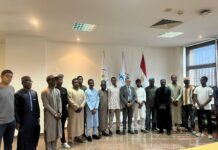Clash of Political Titans: The endless struggles for power in Nigerian politics, by Muhammad Kukuri
The political crises between Godfathers and their successors in Nigerian politics often stem from power struggles, disagreements over policy decisions, or personal ambitions. In a country with a history of political instability and corruption, these conflicts can have far-reaching consequences for governance and the well-being of the population. It is important for leaders to prioritize the needs of the people and work together towards sustainable development, rather than engaging in divisive politics that only serve to further entrench power dynamics.
The recurring narrative of conflicts between political godfathers and their successors is a common theme in Nigerian politics. This storyline has been a constant feature since the dawn of democracy in 1999. The pattern of these clashes has become so predictable that many people feel they have seen this before.
The relationship between former Nigerian President Obasanjo and his Vice President, Atiku Abubakar (Wazirin Adamawa). They were elected together in 1999 after a period of military rule. However, their partnership soon turned sour, with Obasanjo accusing his vice of fraud and sending an impeachment request to the senate. Former President Obasanjo also had plans to control who would succeed him in the 2007 general election, which would have been the first democratic handover of power in Nigerian history since independence in 1960.
READ ALSO:The PDP’s Leadership Shift: How NWC endorsed Damagum, by Muhammad Kukuri
The political landscape of Rivera State provides a contemporary tableau for this age-old narrative, with Governor Sim Fubara and Minister of the Federal Capital territory Barr. Nyesom Wike embroiled in a bitter feud. Minister Wike recently accused Gov. Fubara of renting crowds for thanksgiving and expressed regret for helping him become governor of rivers. Their feud has yet to be resolved, despite a peace deal brokered by President Tinubu in villa.
Kano State Politics between 2015-
The feud between the two former governors of kano State that is Dr. Umar Ganduje, the APC national chairman and Sen. Rabiyu Musa Kwankwaso also the current NNPP national leader has had a significant impact on the political landscape of Kano State, with the state becoming deeply divided along factional lines. The rivalry has also fueled tensions within the state and also at the national level, with both men using their positions to further their own interests and undermine each other’s influence.
Dr. Ganduje was Sen. Kwankwaso’s deputy for 8years between 1999-2003 and 2011-2015 then Ganduje become the next governor in 2015 after his boss complete his tenure, Dr. Umar said he could have slapped his former boss Rabiyu Musa if they met at the Presidential Villa where they separately went to visit President Tinubu.
Dr. Umar Ganduge said on 9th June, 2023 while addressing State House correspondents in Abuja “I know he (Sen. Kwankwaso) is in the building but we have not met. Probably if we met, maybe I could have slapped him,”.
This statement from Dr. Ganduje emphasizes the depth of their falling out and the intense political differences that arose between them. It sheds light on the strained relationship between two prominent figures in Kano State politics.
In Borno State, the political rift between 2011-2019
The feud between the two former governors Sen. Ali Sheriff and Sen. Kashim Shettima had a significant impact on the political landscape of Maiduguri and the state at large. Their disagreement and shift in party affiliations caused a rift within the APC in Borno State and further intensified political divisions in Maiduguri, the Borno State capital.
SAS, Was once the governor of Borno State for 8 good years, handed over power to Sen. Kashim Shettima. However, their differences led to Sheriff leaving the APC then and joining the People Democratic Party. This move ushered in a period of instability and infighting within the PDP, ultimately leading to Sen. Ali removal from his position as the national chairman of PDP.
The fallout between Sen. Sheriff and Sen. Shettima highlights the challenges of maintaining political alliances in Nigeria.
Gombe State similarity grapples with intenal discord between 2011-2019
The political rift and difference between Sen. Ibrahim Dankwambo and Sen. Danjuma Goje in Gombe State. This rift ultimately led to Sen. Goje leaving the PDP to join the APC. This kind of political maneuvering is not uncommon in Nigeria, where power struggles and shifting alliances are a regular part of the political landscape.
It is important for political leaders to resolve their differences with maturity and respect. Resorting to physical violence is never the solution.Sustainable development should be the primary focus of political leaders, rather than engaging in divisive politics that only serve to maintain power dynamics. It is important for leaders to find common ground and work together for the benefit of the people. A new approach that promotes unity and cooperation among political leaders is needed to break the of discord and promote progress and development in Nigeria.
Muhammad Kukuri is a writer from Yobe state, with special interests in politics and journalism. He can be reached via 07062733187 and mohkukuri@gmail.com
Follow the Neptune Prime channel on WhatsApp:
Do you have breaking news, interview request, opinion, suggestion, or want your event covered? Email us at neptuneprime2233@gmail.com




